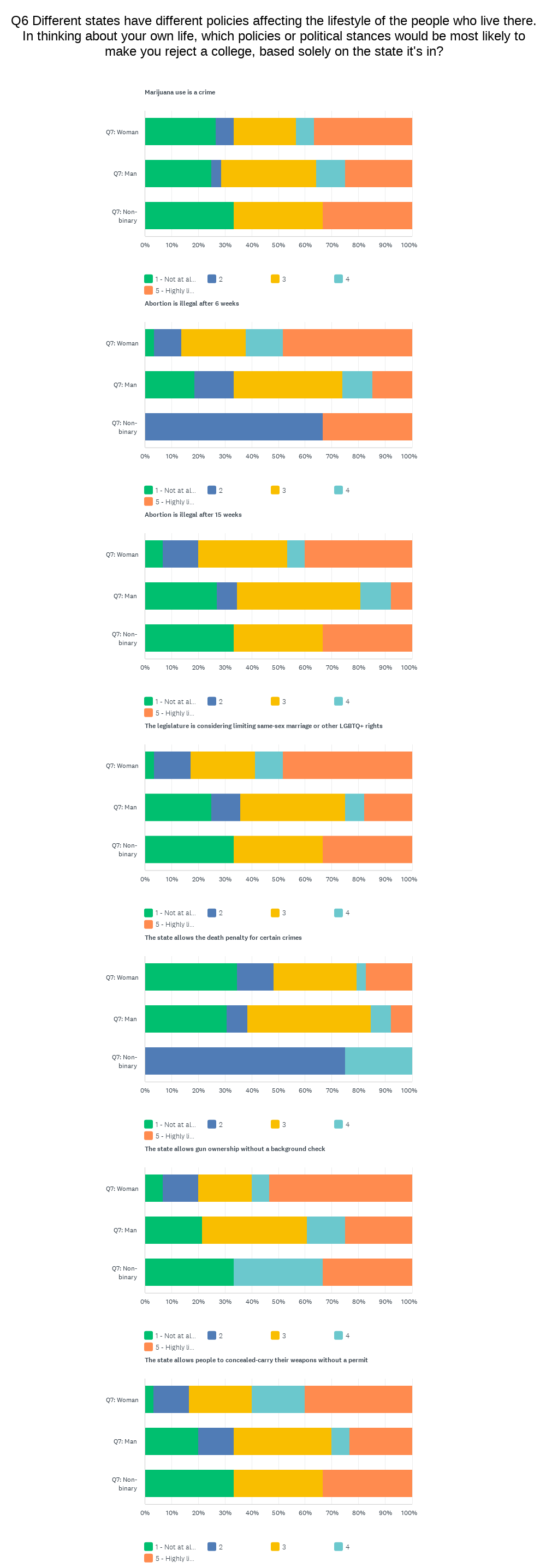Politics & College Selection

Do politics play a role in how students evaluate their college choices?
The other day I was listening to the latest Pivot podcast — Scott Galloway said he thought it was pretty unlikely that a state’s abortion regulations would have any impact on students’ decisions about where to go to college. Here’s the quote:
“I don’t think 18 year olds give a good god damn about Roe v Wade in terms of their decision about where to go to college… In terms of stack ranking on where you’re going to college, that state’s view on choice is just not going to be in the top 10. I think people will think more about whether they have a good football team versus these types of decisions statewide.”
That surprised me — I’d just heard from an acquaintance who was talking to his younger daughter about where to go to school and he told me they were taking options off the table based on access to reproductive healthcare. My sample of one contradicted the sample of Scott.
I wanted to figure out who was right — so I fielded a small survey today of 105 high school and college aged people, of whom 64 either have yet to decide where to apply, are still deciding about which school to select, or are considering changing schools.
(I used SurveyMonkey’s sample panel — our sample was weighted to US Census for gender and ethnicity, selected from 18–28 year olds. 100 or so participants is not enough to say what a larger and more representative sample might say, but it is data — and anyway Scott didn’t have any.)
I asked what the top three factors driving their decisions for college were, and unsurprisingly, cost and curriculum were the top two responses. Location and a variety of other factors vied for third place.
But then we asked another question:
“Different states have different policies affecting the lifestyle of the people who live there. In thinking about your own life, which policies or political stances would be most likely to make you reject a college, based solely on the state it’s in?”
We gave them a short list of controversial policies and asked them to rate each on a five-point scale, where 1 is “Not at all likely to reject” and 5 is “Highly likely to reject”. The list contained these 7 policy descriptions, which we kept simple for the sake of clarity:
- Marijuana use is a crime
- Abortion is illegal after 6 weeks
- Abortion is illegal after 15 weeks
- The legislature is considering limiting same-sex marriage or other LGBTQ+ rights
- The state allows the death penalty for certain crimes
- The state allows gun ownership without a background check
- The state allows people to concealed-carry their weapons without a permit
The weighted average of our respondents’ scaled responses suggests that the top issues that could cause students evaluating their school choices to reject a school based solely on the state’s policies were ranked as follows (in descending order, from most likely to reject to least likely to reject):
- The state allows gun ownership without a background check (weighted average: 3.51; 38% highly likely, 13% likely)
- The state allows people to concealed-carry their weapons without a permit (weighted average: 3.37; 32% highly likely, 12% likely)
- Abortion is illegal after 6 weeks (weighted average: 3.34; 31% highly likely, 11% likely)
- The legislature is considering limiting same-sex marriage or other LGBTQ+ rights (weighted average: 3.31; 32% highly likely, 10% likely)
- Abortion is illegal after 15 weeks (weighted average: 3.13; 25% highly likely, 10% likely)
- Marijuana use is a crime (weighted average: 3.11; 30% highly likely, 10% likely)
- The state allows the death penalty for certain crimes (weighted average: 2.51; 11% highly likely, 7% likely)
We looked at those same responses by gender, and what we saw probably comes as little surprise:
- 48% of women said they would be highly likely to reject a school in a state where abortion is illegal after 6 weeks, and 40% said they would reject a school in a state where it was banned after 15 weeks; less than 15% of men said the same for 6 week abortion bans, and 8% for 15 week bans. Only 7% of women said a 15 week ban would be not at all likely to cause them to reject a school; less than 4% said a 6 week ban would be not at all likely.
- Women were 2.5 times more likely than men to say that a state considering limiting LGBTQ+ rights would make them highly likely to reject a college (48% v. 18%). Less than 4% of them said it was not at all likely to negatively affect their choice.
- Women were twice as likely as men to say that a state that allows gun ownership without a background check would make them highly likely to reject a college (53% v. 25%). Less than 7% of women said it was not at all likely to cause them to reject a school.
- Women were almost twice as likely as men to say that a state that allows permit-less concealed-carry would make them highly likely to reject a college (40% v. 23%). Just over 3% said it was not at all likely to cause them to reject a school.
- Women were also more likely than men to say that a state where marijuana use is a crime would make them highly likely to reject a school (37% v. 25%). About a quarter of both men and women said it was not at all likely to cause them to reject a school.

So what are we to make of this? Well, first of all — abortion policy could be a factor for a significant number — over half — of women who are evaluating their college options. It may not matter as much to men — but women also outnumber men for both college enrollment and graduation rates.
What surprised us, however, was how important gun regulations were — and how comparatively unimportant legal marijuana was — among young people evaluating their school options. That probably says a lot about their experiences as students in American schools, fitted out with armed guards, metal detectors, and active shooter drills; and their experiences as Americans, where 45,000 people died from guns in 2020.
Now, we didn’t ask about other policies or political stances taken by state elected officials. And we didn’t include these policies in the list of drivers. Based on the key factors of cost, curriculum and career prospects (particularly among our women respondents), we’d probably guess that these are not usually top of mind criteria for college selection. But “location” is frequently in the top 3 criteria.
So one unanswered question based on this short and small survey is how aware students are of these state policies as they evaluate their options — but colleges and universities in states that are making themselves famous for abortion restrictions, a lack of gun restrictions, and an intention to roll back rights for the LGBTQ+ community should be very, very concerned.
By the way, Scott, if you’re reading this, we did ask about the importance of a sports program in the drivers of choice, and less than 8% selected “has the sports program I want” among their top 3 drivers — no women selected it at all.
If you’d like to know more about this short survey of drivers of higher education decisions, or help answering any other, “wait, what?” questions, you can always get in touch with us here.

